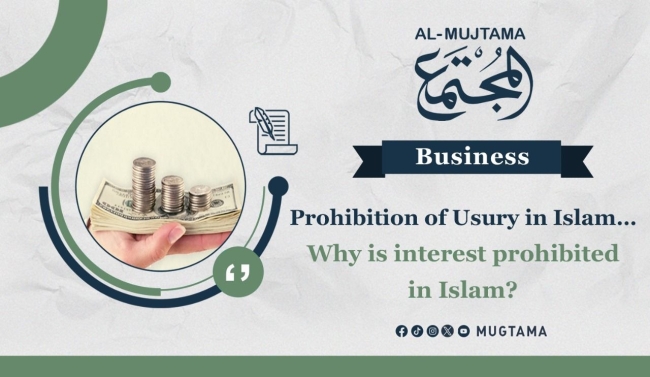Prohibition of Usury in Islam… Why is interest prohibited in Islam?
Usury (riba) in language is defined as excess and increase. In Islam, usury is the unjust, exploitative gains made in trade or business. It is prohibited and considered a major sin, as it exploits people's needs by gaining financial profit or additional interest without offering real work or compensation.
The Prophet ﷺ said: "Gold should be exchanged with gold based on weight, and silver should be exchanged with silver based on weight. Salt should be exchanged with salt in equal measure, barley should be exchanged with barley in equal measure, wheat should be exchanged with wheat in equal measure, and dates should be exchanged with dates in equal measure. Anyone who adds more or asks for more has engaged in a form of usury." (Reported by Muslim)
Types of Usury: Usury is divided into two main types:
1. Riba al-Fadl
Riba al-fadl is the excess accruing in a sale or barter transaction. This type of usury occurs when a commodity is exchanged for another commodity of the same kind but in unequal quantities. For example, if one kilogram of dates is exchanged for one and a half kilograms of another type of dates, this is considered riba al-fadl, which is prohibited because it leads to unfair disparity between the exchanging parties.
2. Riba al-Nasi'ah
Riba al-nasi'ah is the most common and dangerous form of usury. It refers to the delay or increase in debt due to delayed payment. This type occurs when a person owes another a sum of money or a specific commodity, and in case of delayed payment, an increase (interest) is imposed on the original amount. This is the type of usury that was prevalent in pre-Islamic times, where it was said: "Either you pay or you increase," meaning either you settle the debt on the due date or an increase (interest) is added.
Fair trade versus exploitative prohibition:
Allah says: "That is because they say: “Trade is like usury,” but Allah hath permitted trade and forbidden usury" (Al-Baqarah: 275). But why has Allah permitted trade and prohibited usury?
Trade is allowed because it brings many benefits to all participants in the economic process. When a person sells or manufactures something, all parties involved, from workers to manufacturers and buyers, benefit. Trade contributes to societal growth and brings benefit to everyone.
Meanwhile, usury is forbidden because it embodies exploitation of people's needs, especially the poor and needy. It is a form of economic enslavement, where capital owners monopolize society's resources and exploit others' needs, leading to control and domination over people's lives.
The consequences of usury on societies include:
1. Economic disparity and poverty
Usury leads to the concentration of wealth in the hands of a few who can lend money at high interest rates, while the poor suffer from increasing debt burdens. The gap between the rich and poor widens, making it difficult for the lower and middle classes to improve their living conditions due to accumulated debts and interest that drains their income.
2. Economic exploitation between nations
On an international level, usury is evident in the external debts imposed by global financial institutions on developing nations. Poor countries resort to borrowing to finance developmental projects or cover budget deficits. However, high interest rates on these loans make repayment impossible, leading to increased poverty and dependency on wealthy nations. In addition, creditor countries impose conditions, controlling the affairs of the indebted country, creating a form of "economic slavery" where indebted countries are at the mercy of creditors, affecting their economic and political sovereignty and resources. This is modern-day enslavement.
3. Impact on social stability
Interest-based loans exacerbate economic crises such as inflation and rising prices. When dependency on usurious loans increases to finance projects or meet daily needs, economic pressure on families and individuals intensifies, leading to increased social tensions, rising poverty, unemployment due to debt, and subsequently higher crime rates, family breakdowns, and even suicide in some cases.
Usury is not only an economic injustice, but it also brings loss of blessing, its social and moral consequences are devastating, and its consequences in the Hereafter are severe. This is why Allah has forbidden usury, honoring and dignifying mankind by preventing them from becoming slaves to banks and international institutions.
-------------------------------------------------------------
The sources:
1. Ibn Baz website, Usury and its Danger
2. Majmu' Fatawa of Ibn Taymiyyah
3. Sheikh Uthman Al-Khamis explanation of “Dalil Al-Talib” book.


